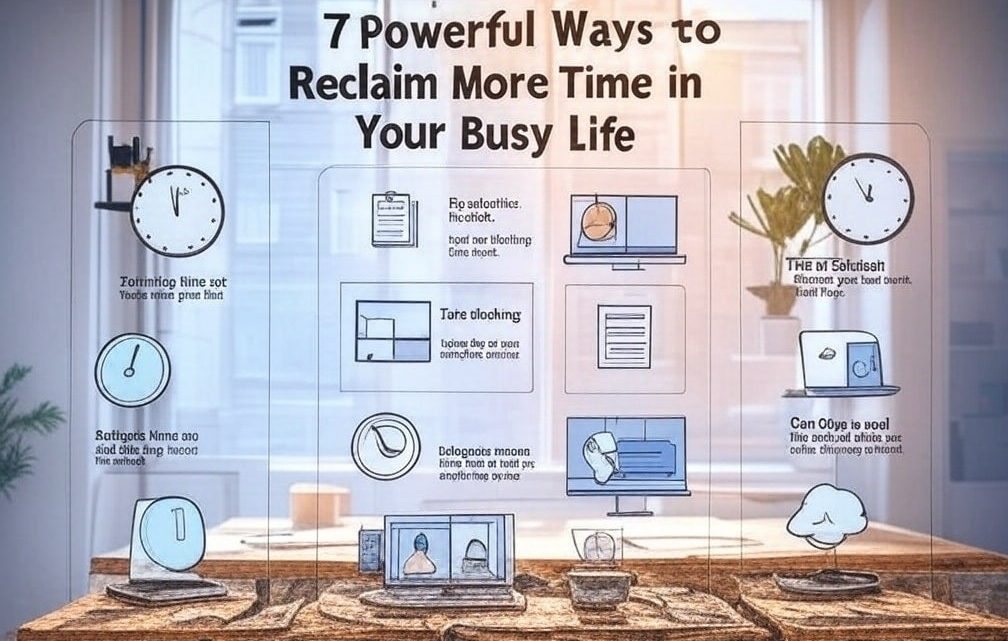
7 Powerful Ways to Reclaim More Time in Your Busy Life
April 1, 2025Ever feel like the clock is your worst enemy? Yeah, me too. We all get the same 24 hours daily, but some people seem to squeeze magic out of every minute while the rest of us wonder where the day went. I’ve been obsessed with this problem lately—how to make time work for me instead of against me.
The math is pretty brutal when you break it down. Eight hours for sleep, couple hours eating, another two commuting… before you know it, half your day vanishes without accomplishing anything meaningful. Add in scrolling through social media (guilty as charged) and binge-watching that new series everyone’s talking about, and suddenly you’re down to maybe 9 productive hours. And that’s being generous!
Some folks get so desperate they try extreme solutions like polyphasic sleep patterns or speed reading techniques. But honestly? You don’t need to go that far. I’ve discovered some practical time management strategies that actually work without turning you into a productivity robot.
1. Cut the Screen Time Addiction
Let’s be real—screens are the ultimate time thieves. I used to think I was just “unwinding” with a quick YouTube video, but three hours later I’d still be in the same spot, having accomplished nothing. The algorithm knows exactly how to keep us hooked.
What worked for me was setting actual timers. Thirty minutes of TV, not three hours. And those video sharing sites? They’re designed to keep you watching forever. I’m not saying eliminate entertainment completely—that would make life pretty miserable. But being intentional about it makes a huge difference.
Try this: track your screen time for a week (most phones have this feature built in now). The results might shock you into making changes. I discovered I was spending nearly 4 hours daily on my phone alone! Cutting that in half instantly gave me back 14 hours weekly.
2. Embrace the Power of Routine
Routines sound boring, but they’re secretly magical time-savers. When you do something regularly, your brain creates shortcuts. You stop wasting mental energy deciding what to do next.
I started small with a morning routine—coffee, quick workout, shower, breakfast. Same order, every day. Within weeks, I was moving through mornings on autopilot, saving at least 20 minutes of decision-making time. Plus, I stopped forgetting things because the sequence became second nature.
The trick is connecting activities in a logical flow. For example, I now prep coffee before bed so it’s ready to brew in the morning. These tiny optimizations add up dramatically over time. And once routines become habits, they stop requiring willpower—which means you save even more mental energy for important stuff.
3. Find Creative Alternatives
Once you’ve established routines, you start noticing inefficiencies everywhere. This is where the real time-saving magic happens.
For instance, I realized my commute was eating two hours daily. So I negotiated working from home twice weekly—boom, four hours saved! For grocery shopping, I switched to a delivery service. Yes, it costs a bit more, but the time saved is worth every penny.
Look for those moments when your gut says “this is taking too long.” That’s your cue to find an alternative approach. Sometimes the solution is technological (like using voice-to-text instead of typing), sometimes it’s delegation, and sometimes it’s eliminating the task entirely. Be ruthless about questioning whether activities deserve your precious time.
4. Get Serious About Organization
Nothing wastes time like searching for stuff you can’t find. I used to spend ridiculous amounts of time hunting for documents, keys, or that one specific shirt. The solution seems obvious—get organized—but the execution is where most people fail.
What finally worked for me was categorizing everything and giving items dedicated homes. Digital files go in logical folders with consistent naming conventions. Physical items get labeled containers. Important documents have a specific drawer.
The initial organization takes time—I spent an entire weekend sorting my home office—but the payoff is enormous. Now I can find anything in seconds rather than minutes or hours. Plus, there’s this weird psychological benefit: organized spaces create mental clarity that helps you work faster.
5. Master Strategic Multitasking
Multitasking gets a bad rap, and sometimes for good reason. Texting while driving? Absolutely not. But there are legitimate ways to layer activities that don’t require your full attention.
I’ve learned to fold laundry during phone calls, listen to audiobooks while exercising, and review meeting notes during my train commute. The key is pairing a physical task with a mental one, or combining a high-attention activity with a low-attention one.
My neighbor takes this to another level—she does language learning audio lessons during her morning routine and uses a standing desk with a treadmill to get steps in while working. Sounds extreme, but she swears it works for her.
Start small though. Try one combination that feels natural, like listening to a podcast while cooking dinner. Once that becomes comfortable, add another pairing to your repertoire. Just remember that some tasks—especially creative or complex ones—deserve your undivided attention.
6. Anticipate and Prevent Distractions
The most efficient path between two points is a straight line, but distractions create detours that waste enormous amounts of time. The trick isn’t just dealing with distractions when they happen—it’s preventing them before they start.
I’ve become almost paranoid about protecting my focus time. Phone goes on Do Not Disturb. Email notifications turned off. Door closed with a “Working—Please Don’t Disturb” sign. These boundaries seem extreme until you realize how much time they save.
For unavoidable interruptions like noisy neighbors or construction, I keep noise-cancelling headphones handy. For digital distractions, I use website blockers during focused work periods.
The hardest distractions to manage are internal ones—like when your brain suddenly decides you absolutely must research that random thing right now. For these, I keep a “distraction notepad” where I quickly jot down the thought to address later. This simple trick prevents me from falling down rabbit holes during productive time.
7. Tackle Emotional Time-Wasters
This might be the most important point of all. We waste tremendous amounts of time on unproductive emotional patterns—worrying about things we can’t control, ruminating over past mistakes, or avoiding tasks due to irrational fears.
I used to procrastinate on important calls because of anxiety. I’d spend hours stressing about a five-minute conversation! Eventually I realized this emotional pattern was costing me more time than the actual tasks themselves.
Techniques like Emotional Freedom Technique (EFT) or the Sedona Method can help break these patterns. Sometimes just naming the emotion (“I’m avoiding this because I’m afraid of rejection”) is enough to reduce its power.
Be honest with yourself about emotional time-wasters. Are you spending hours scrolling social media because you’re avoiding something difficult? Are you overthinking decisions to the point of paralysis? These patterns can steal more time than any external distraction.
Key Takeaways
- Screen time is likely your biggest time thief—track it and set intentional limits
- Well-designed routines eliminate decision fatigue and create efficiency through repetition
- Organization systems pay massive dividends by eliminating search time
- Strategic multitasking works when combining complementary activities
- Preventing distractions is more effective than dealing with them after they occur
- Emotional patterns often waste more time than external factors
Remember, time might be a human concept, but it’s the most non-renewable resource we have. You can always make more money, but you can never make more time. Treat it accordingly.
FAQ
How long does it take to establish a new time-saving routine?
Most habits take about 21-30 days to become automatic. During this period, you’ll need to consciously maintain the routine before it feels natural. Start with just one routine change and give yourself grace during the adjustment period—consistency matters more than perfection.
What if my job requires me to be constantly available and responsive?
Set boundaries where possible. Block specific times for focused work and communicate these to colleagues. Use tools like email auto-responders during deep work periods. Even in high-response jobs, you can usually negotiate small windows of uninterrupted time that will dramatically improve your productivity.
How do I stop feeling guilty about taking time for myself?
Reframe self-care as productivity maintenance rather than indulgence. Just as you wouldn’t expect a car to run without regular maintenance, your brain and body need downtime to perform optimally. Quality rest actually makes your working hours more efficient, creating a net time gain.

